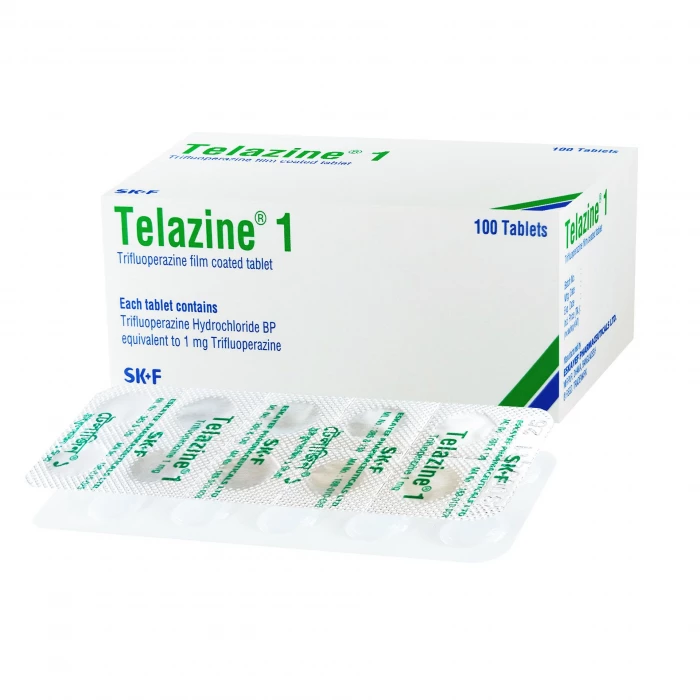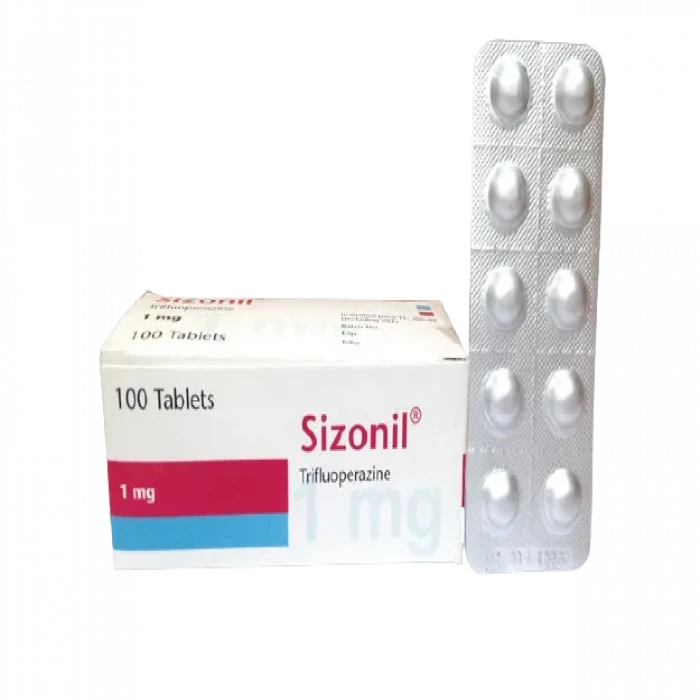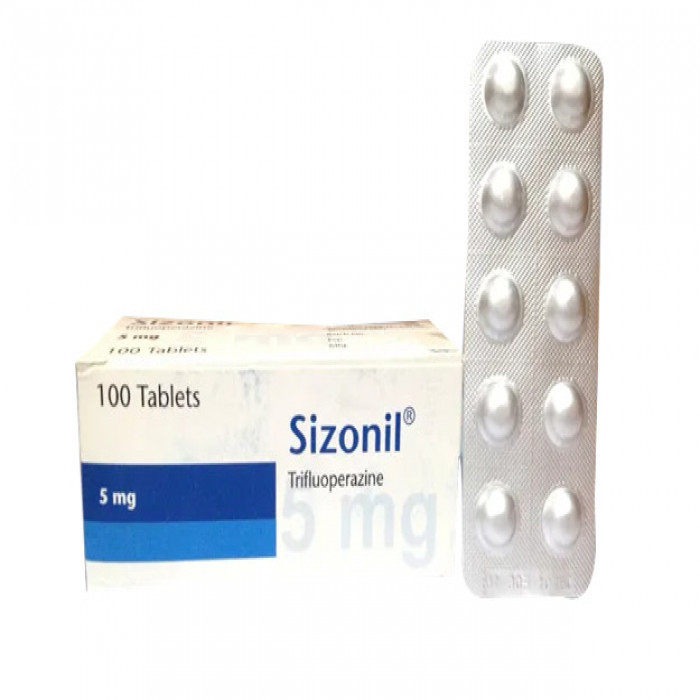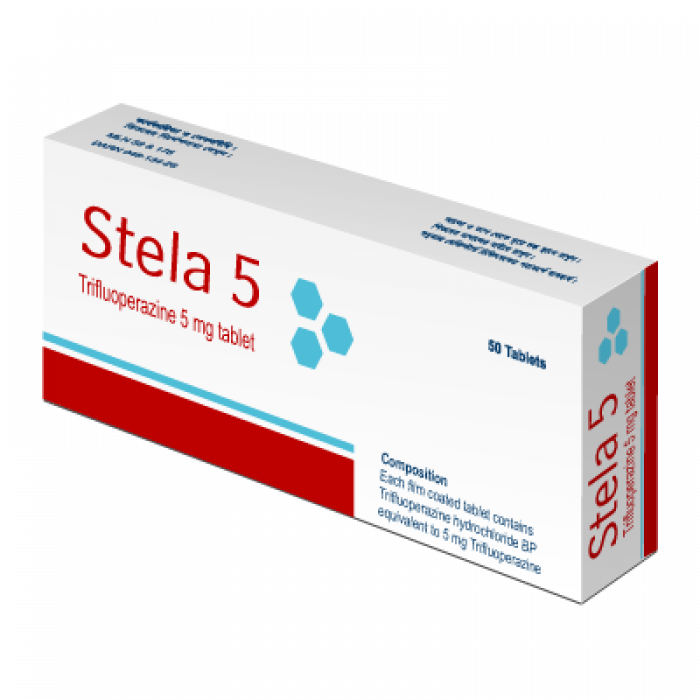
✔ 100% Authentic Product
👁️ Currently Viewing 3529
✅ Description:
- Telazine 1mg Tablet is a prescription medication used to treat schizophrenia and anxiety disorders. It works by altering thoughts and elevating mood, which improves the individual’s ability to think, feel, and behave. It also reduces aggression and hallucinations.
Safety Advices

Alcohol
UNSAFE
Consuming alcohol while taking Telazine 1mg Tablet is not recommended due to the increased risk of severe side effects such as excessive drowsiness, dizziness, nausea, and vomiting.

Pregnancy
UNSAFE
Telazine 1 may be unsafe to use during pregnancy. Although there are limited studies in humans, animal studies have shown harmful effects on the developing baby. Your doctor will weigh the benefits and any potential risks before prescribing it to you. Please consult your doctor

Breastfeeding
UNSAFE
Telazine 1 is probably unsafe to use during breastfeeding. Limited human data suggests that the drug may pass into the breastmilk and harm the baby.

Driving
CAUTION
Telazine 1 may cause side effects which could affect your ability to drive. Telazine 1 makes u feel dizzy, and drowsy or can cause blurred vision. This may affect your driving ability.

Kidney
CONSULT YOUR DOCTOR
There is limited information available on the use of Telazine 1 in patients with kidney disease. Please consult your doctor.

Liver
CONSULT YOUR DOCTOR
There is limited information available on the use of Telazine 1 in patients with liver disease. Please consult your doctor. However, the use of Telazine 1 is not considered safe in patients with liver disease as per the available data.
✔️ Uses:
- Anxiety, Tension, and Agitation: Effective in controlling excessive anxiety, tension, and agitation associated with neuroses or somatic conditions.
- Psychotic Disorders: Manages acute or chronic schizophrenia, including catatonic, hebephrenic, and paranoid types; psychosis due to organic brain damage; toxic psychosis; and the manic phase of manic-depressive illness.
✔️ Side Effects:
Common side effects include orthostatic hypotension (sudden drop in blood pressure on standing), drowsiness, dry mouth, abnormal voluntary movements, weight gain, increased prolactin levels, urinary retention, constipation, muscle stiffness, and tremor. Report any severe or unusual side effects to your doctor immediately.
✔️ Pharmacology:
- Trifluoperazine belongs to the phenothiazine class, which primarily acts by antagonizing dopamine receptors in the central nervous system (CNS). This action is believed to provide its antipsychotic effects by affecting the limbic system and related cerebral cortex areas. Its antiemetic properties are due to its action on the medullary chemoreceptor trigger zone.
✔️ Side Effects
Common side effects include transient restlessness, dystonias, and symptoms resembling parkinsonism. Other central nervous system reactions are drowsiness, dizziness, fatigue, blurred vision, and seizures. Occasionally, peripheral edema, blood dyscrasias, and jaundice may occur. Rarely, patients might experience tachycardia, constipation, urinary hesitancy and retention, and hyperpyrexia.
✔️ Dosage & Administration:
Schizophrenia and Other Psychoses:
- Adults and Children Over 12 Years: Start with 2-5 mg twice daily, increasing by 5 mg daily after one week, then every three days based on response.
- Children (6-12 Years): Start with 1 mg twice daily, adjusting according to weight and symptom severity. Usually, not exceeding 15 mg daily.
- Elderly: Start with at least half the usual dose.
Short-Term Management of Severe Anxiety:
- Adults and Children Over 12 Years: 1-2 mg twice daily, with a maximum of 6 mg daily if needed.
- Children (3-5 Years): 1 mg daily.
- Children (6-12 Years): Up to 4 mg daily in divided doses.
- Elderly: Start with at least half the usual dose.
Antiemetic:
- Adults: 2-4 mg daily in divided doses, with a maximum of 6 mg daily.
- Children (3-5 Years): Up to 1 mg daily.
- Children (6-12 Years): Up to 4 mg daily.
✔️ Overdose Effects
Overdose symptoms predominantly involve extrapyramidal reactions and hypotension. Treatment includes gastric lavage along with supportive and symptomatic measures. Vomiting should not be induced. Extrapyramidal symptoms can be treated with anticholinergic or antiparkinsonian drugs. Hypotension should be managed with fluid replacement, and noradrenaline may be used if severe or persistent. Adrenaline is contraindicated.
✔️ Interactions:
- May reduce the effectiveness of oral anticoagulants.
- Propranolol and trifluoperazine taken together can increase plasma levels of both drugs.
- Phenothiazines may counteract the effects of guanethidine and related compounds.
- Can potentiate CNS depressants like alcohol, hypnotics, and anticonvulsants.
✔️ Contraindications:
- Not to be used in comatose patients, those with blood dyscrasias, liver damage, or hypersensitivity to phenothiazines.
✔️ Pregnancy & Lactation
Pregnancy: The safety of trifluoperazine during pregnancy has not been established. It is generally not recommended for pregnant women unless deemed essential by a physician. The potential benefits must outweigh the possible risks. There have been reports of prolonged jaundice, extrapyramidal symptoms, hyperreflexia, or hyporeflexia in newborns whose mothers took phenothiazines during pregnancy.
Lactation: There is insufficient data on the safety of trifluoperazine during lactation.
✔️ Precautions & Warnings
Special caution should be exercised when treating elderly patients, starting with a reduced initial dosage. These patients are particularly sensitive to extrapyramidal and hypotensive effects. Patients with cardiovascular disease, including arrhythmias, should be treated with caution, as well as those with angina pectoris.
✔️ Storage Conditions
- Store at room temperature between 15-30°C, away from light and moisture.
⚠️Disclaimer:
At ePharma, we’re committed to providing accurate and accessible health information. However, all content is intended for informational purposes only and should not replace medical advice from a qualified physician. Please consult your healthcare provider for personalized guidance. We aim to support, not substitute, the doctor-patient relationship.









